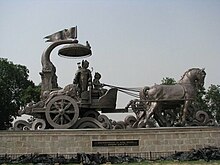Our website is made possible by displaying online advertisements to our visitors.
Please consider supporting us by disabling your ad blocker.
Karma yoga
| Part of a series on |
| Hinduism |
|---|
 |

Karma yoga (Sanskrit: कर्म योग), also called Karma marga, is one of the three classical spiritual paths mentioned in the Bhagavad Gita, one based on the "yoga of action",[1] the others being Jnana yoga (path of knowledge) and Bhakti yoga (path of loving devotion to a personal god).[2][3][4] To a karma yogi, right action is a form of prayer.[5] The paths are not mutually exclusive in Hinduism, but the relative emphasis between Karma yoga, Jnana yoga and Bhakti yoga varies by the individual.[6]
Of the classical paths to spiritual liberation in Hinduism, karma yoga is the path of unselfish action.[5][7] It teaches that a spiritual seeker should act according to dharma, without being attached to the fruits or personal consequences. Karma Yoga, states the Bhagavad Gita, purifies the mind. It leads one to consider dharma of work, and the work according to one's dharma, doing god's work and in that sense becoming and being "like unto god Krishna" in every moment of one's life.[5]
- ^ P. T. Raju (1954), The Concept of the Spiritual in Indian Thought, Philosophy East and West, Vol. 4, No. 3 (Oct., 1954), pp. 210.
- ^ John Lochtefeld (2014), The Illustrated Encyclopedia of Hinduism, Rosen Publishing New York, ISBN 978-0823922871, pp. 98–100, also see articles on bhaktimārga and jnanamārga
- ^ Klostermaier, Klaus (1989). A survey of Hinduism. State University of New York Press. pp. 210–212. ISBN 978-0-88706-807-2.
- ^ Karen Pechelis (2014), The Embodiment of Bhakti, Oxford University Press, ISBN 978-0195351903, pp. 14–15, 37–38.
- ^ a b c Robert A. McDermott (1975), Indian Spirituality in the West: A Bibliographical Mapping, Philosophy East and West, University of Hawai'i Press, Vol. 25, No. 2 (Apr 1975), pp. 228–230
- ^ W. Horosz; Tad Clements (2012). Religion and Human Purpose: A Cross Disciplinary Approach. Springer Science. pp. 258–259. ISBN 978-94-009-3483-2.
- ^ Harold G. Coward (2012). The Perfectibility of Human Nature in Eastern and Western Thought. State University of New York Press. pp. 142–145. ISBN 978-0-7914-7885-1.
Previous Page Next Page


